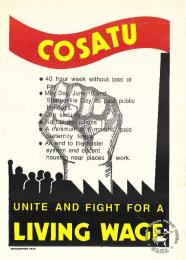[For More Information on Individual Posters, Click or Hover Over Images]
Towards the end of November 1986, whilst I was an inmate of Johannesburg Prison, I was taken under escort to Hillbrow for a medical appointment. As the police van I was in parked outside the doctor's rooms, hundreds of singing and slogan-shouting workers marched by, defiantly holding aloft a huge COSATU banner. In the sea of faces, I saw several bright red and yellow posters which bore, in bold, black lettering, the words: 'We demand a living wage!'
To me, the scene I had just witnessed, as I got out of the police van and walked, chained in leg-irons like a dangerous beast, across the pavement and into the doctor's rooms, was a great morale booster. What I had just seen appealed directly to my heart and mind, and reminded me that the cause for which I was in prison was a just one.
As soon as I completed writing my University of South Africa (UNISA) examinations a few days later, I started work on a series of posters, which I drew on the inside covers of examination writing pads.
On 8 January 1987, the 65th anniversary of the founding of the African National Congress, I hung up the posters just a few minutes before our clandestine commemoration service was to take place in the cell where we normally met for political discussions. Spontaneous and joyous shouts of 'Amandla!' and 'Viva ANC-SACP-COSATU!' rang out as comrades saw the colourful posters. It was clear from the immediate response of all present that the posters had succeeded in their objective to communicate.
This book presents a meaningful and inspiring sample of posters produced and published by the Congress Movement. It graphically shows us the manner in which Congress organisations communicated with the oppressed people, politicising them, and pointing out political campaigns to be engaged in and tasks to be done; in sum: asking for co-operation and total commitment to the struggle.
Just paging through the posters reproduced in this book will enable us to revisit the challenges and the struggles that our people faced so dramatically and bravely in the 1980s. These posters bear testimony to the flexibility in their approach, and the issues around which they campaigned. The cumulative effect of these posters evokes an extreme sense of urgency coupled with a drive to mobilise feeling and reason, and to put both to the service of day-to-day struggles through concrete action.
But the last poster has not been printed yet. Today, the interests and perceptions of South Africans are changing as we move towards the so-called New South Africa. The present state of flux has produced more critically-minded viewers, who make greater demands on the poster artist-cum-activist. Artistic techniques are necessary and appreciated, but it is not enough to be merely technically competent. In order to keep abreast with the demands of the times, poster-makers will have to look at the world anew. We must strive for originality and novelty in our images, a balance in form and content, but above all, we must retain the strength that marks many of these posters: their power to communicate effectively by fusing aesthetic validity with simplicity so as to express an idea in the most incisive way.
Dikobewa Mogale Ben Martins



